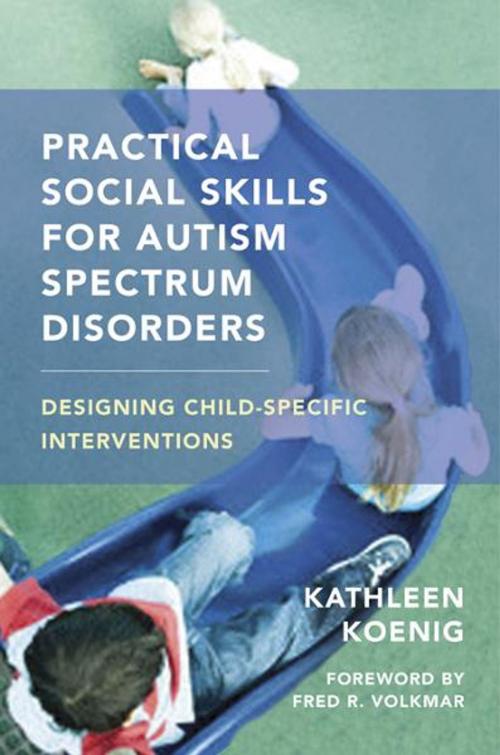Practical Social Skills for Autism Spectrum Disorders: Designing Child-Specific Interventions
Nonfiction, Health & Well Being, Psychology, Mental Health| Author: | Kathleen Koenig | ISBN: | 9780393707748 |
| Publisher: | W. W. Norton & Company | Publication: | March 12, 2012 |
| Imprint: | W. W. Norton & Company | Language: | English |
| Author: | Kathleen Koenig |
| ISBN: | 9780393707748 |
| Publisher: | W. W. Norton & Company |
| Publication: | March 12, 2012 |
| Imprint: | W. W. Norton & Company |
| Language: | English |
Building a child’s “social repertoire” for more effective autism treatment.
Autism spectrum disorders (ASDs) are an alarmingly prevalent topic of conversation in the news, in pediatrician and therapists’ offices, in classrooms, among concerned parents, and at home, within families. The rate of diagnoses seems only to rise. It’s not surprising that professionals who work with kids on the autism spectrum are eager for effective resources on how to help children and their parents or caregivers manage it. And with this book, readers have a new tool to add to their arsenal.
Drawing on her work at the Yale Child Study Center, Koenig explains how critical it is for kids to not simply learn new social skills that fit their individual needs, but to be able to seamlessly integrate them into a range of day-to-day situations, from the classroom to the lunchroom to the dinner table at home. Building their "social repertoire" in this way, she argues, is key to effective autism treatment. Unlike other autism books that tend to be prescriptive in their approach to social skills training, this one teaches that the best social interventions are evidence-based, child-specific, and meaningfully integrated.
Guiding readers through the overarching considerations and principles for designing successful social interventions, Koenig presents a host of specific techniques—visual strategies and supports, scripts and role play, developmental play approaches, video modeling, peer mediated approaches, technology-based instruction, group instruction, self-monitoring strategies, parent-delivered interventions, and much more. Case vignettes illustrate how each intervention can be implemented, and what trouble-shooting techniques can be used when a child isn’t responding well. Koenig also provides advice on how parents and professionals can work together as a team, how to help kids “generalize” their newly learned skills across contexts, and how to measure progress in a sensible way.
With a foreword by renowned child psychiatrist Fred Volkmar, Practical Social Skills for Autism Spectrum Disorders is sophisticated in its methodology but highly accessible, hands-on, and user-friendly. An invaluable manual for clinicians, educators, school counselors and administrators, parents, and all those who work with kids on the autism spectrum, it unravels the nuances of effective social skills training by showing how to really create intervention programs that take kids' own aptitudes and needs into account. With time, the right teaching, and compassion, they can achieve a life of full engagement with their families and communities.
Building a child’s “social repertoire” for more effective autism treatment.
Autism spectrum disorders (ASDs) are an alarmingly prevalent topic of conversation in the news, in pediatrician and therapists’ offices, in classrooms, among concerned parents, and at home, within families. The rate of diagnoses seems only to rise. It’s not surprising that professionals who work with kids on the autism spectrum are eager for effective resources on how to help children and their parents or caregivers manage it. And with this book, readers have a new tool to add to their arsenal.
Drawing on her work at the Yale Child Study Center, Koenig explains how critical it is for kids to not simply learn new social skills that fit their individual needs, but to be able to seamlessly integrate them into a range of day-to-day situations, from the classroom to the lunchroom to the dinner table at home. Building their "social repertoire" in this way, she argues, is key to effective autism treatment. Unlike other autism books that tend to be prescriptive in their approach to social skills training, this one teaches that the best social interventions are evidence-based, child-specific, and meaningfully integrated.
Guiding readers through the overarching considerations and principles for designing successful social interventions, Koenig presents a host of specific techniques—visual strategies and supports, scripts and role play, developmental play approaches, video modeling, peer mediated approaches, technology-based instruction, group instruction, self-monitoring strategies, parent-delivered interventions, and much more. Case vignettes illustrate how each intervention can be implemented, and what trouble-shooting techniques can be used when a child isn’t responding well. Koenig also provides advice on how parents and professionals can work together as a team, how to help kids “generalize” their newly learned skills across contexts, and how to measure progress in a sensible way.
With a foreword by renowned child psychiatrist Fred Volkmar, Practical Social Skills for Autism Spectrum Disorders is sophisticated in its methodology but highly accessible, hands-on, and user-friendly. An invaluable manual for clinicians, educators, school counselors and administrators, parents, and all those who work with kids on the autism spectrum, it unravels the nuances of effective social skills training by showing how to really create intervention programs that take kids' own aptitudes and needs into account. With time, the right teaching, and compassion, they can achieve a life of full engagement with their families and communities.















